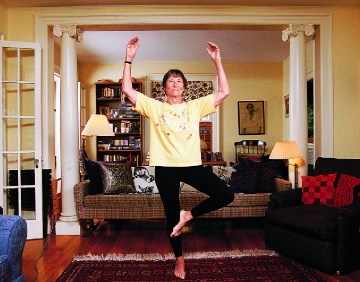Retirement entails "learning how to maintain self-respect while letting go of self-importance," writes Harvard professor of psychiatry George E. Vaillant '55, M.D. '59, in his book Aging Well. The much-touted "third age" can be frightening for many ambitious, successful people who are used to living on the front lines of their professions. For them, the notion of leaving work connotes a forced withdrawal from the exciting buzz of their busy world.
Yet almost everyone expects to retire. Retirement "has colonized adulthood," claims David J. Ekerdt, a University of Kansas sociologist who studies retirement and aging. "Family and friends expect it. People at work expect you won't be there past age 60 or 65. The current stories about the stock market are yoked to retirement: the side story is always 'Can you afford to retire?' Retirement is something to which we think we are entitled."
This is surprising because retirement income was not widely available until after World War II, notes Clare Hushbeck, a labor economist for AARP (the former American Association of Retired Persons). "For most of history, people worked until they couldn't work anymore," she explains. "Retirement as we know it has been around only for the last 25 to 30 years, but it has become widely accepted as the final stage in life." The post-war "golden-age retirees" (the grandparents of 30-somethings and the parents of baby boomers) received expanding pension plans and post-retirement health benefits, years of substantial wage increases, and rapidly rising Social Security payments (until the payouts were automatically linked to inflation rates), Hushbeck points out. Those anticipating retirement now may face a starker scenario.
 |
| Natalie Goethals finds practicing yoga helpful in her retirement years. |
| Photograph by Jim Harrison |
Unpredictable labor-market trends and new economic factorsstock-market volatility, fallout from corporate accounting scandals, the debate over Social Security, to name a fewwill affect who retires and how. So will the increase in longevity. Most baby boomers have probably not saved enough money to retire comfortably, Hushbeck says, and Social Security (along with company pensions) will likely become less generous, leading people to retire later than they might have. Moreover, people are realizing that they may have 20 to 30 active years of "retirement," and one can make only so many trips to the green..."We're seeing a shift in retirement because more older people are working longer [by choice or from financial necessity] and we're seeing some people trying to come back to work," reports Hushbeck. "Our polls indicate that boomers plan to continue some kind of paid work well into their retirement years."
In 2000, 44 percent of the retirees interviewed for the final report of the Cornell Retirement and Well-Being Study said that they worked for pay at some point after retiring; men were more likely to pursue this option than women, as were the younger subjects. That work most often took the form of self-employment: individuals either started a new business or worked on a contractual or consulting basis. "Traditionally there have been two options for older workers: work full time, 40 or even 50 hours a week, at a high-pressure job, or quit 'cold turkey,'" says principal investigator Phyllis Moen, Ferris family professor of life course studies at Cornell. "Most older workers these days want something in between"even though "partial retirement is just not on the radar screen in terms of policies and practices at most companies."
Many retirees might desire the situation of Dudley R. Herschbach, Ph.D. '58, Jf '59, now Baird research professor of science at Harvard, who began his "perpetual sabbatical" in September. "When people think of 'retired,' they think of a cessation, at least of a person's principal activity," says Herschbach, a Nobel laureate. "But when it comes to faculty, who have a deep and obsessive commitment to the scholarly fields they have devoted a major part of their lives to, 'perpetual sabbatical' is a much more appropriate phrase. The whole idea is to free yourself to do more work."
At 70, Herschbach believes it is his duty to step aside and "make way for the ducklings," but, with his lab and office intact, he will continue his research, teach a freshman seminar, and commute monthly to Washington, D.C., as a senior research fellow at the Carnegie Institution. "My major worry is that I am deluding myself because I won't be able to free myself to the extent I imagine is necessary to change my focus and have time to carry on my own research and writing," he says. "I am still doing as much or more than I would typically be doing this time of year at Harvard."
What effect retirement has on us emotionally is a matter of debate, according to "Retirement Transitions, Gender, and Psychological Well-Being: A Life-Course Ecological Model," published earlier this year in the Journal of Gerontology: Psychological Sciences. Phyllis Moen and colleague Jungmeen E. Kim concluded that retirement must be viewed as "a complex process, embedded in prior psychological resources as well as gendered experiences." Interestingly, there appear to be major differences between those who are anticipating retirement, or are newly retired, and those past the "honeymoon" phase. The latter group tended to report increased feelings of depression.
"Retiring can be a mixed-up time for everyone," says Moen, who spent 2000-2001 as a fellow at the Radcliffe Institute for Advanced Study, working on her forthcoming book, It's About Time: Couples and Careers (Cornell). "Work is a place where we get a source of routine, income, status, a sense of purpose, and a community of coworkers and friends. Retirement disrupts all of that and making that change can be emotionally stressful"even if a person is financially secure.
Natalie Goethals, Ed.M. '52, retired from Harvard's financial-aid and development offices in June 2001. That summer was wonderful: she traveled a lot, saw her children and grandchildren, and spent time at her family home on Martha's Vineyard. But when autumn came, she was accustomed to gearing up for work and the academic year. Her late husband, George W. Goethals '43, Ed.D. '53, was a longtime faculty member in social relations and psychology; he died in 1995. She was still grieving that loss when she left her job.
"That fall I missed the collegiality of work, the friends, the warm bodies around who care about what you are doing," says Goethals, 76. "If you want companionship, you are the one who has to make the overtures. I became depressed and lonely. My heart was down. So I got some professional help that got me through this period of transition. I'm a great believer in asking for help when you need it."
Also immensely useful were her long-term, preretirement habits. She keeps journals, practices yoga, belongs to two women's groups, and performs community and social service, including volunteering in the hospice movement. She has also joined the Unitarian Church. "When I retired I knew I was going to do something about my wayward spirituality," she says with a laugh.
Plenty of men and women, in fact, adjust easily to retirement and find it among the happiest times in their lives. "What's not to like?" asks Ekerdt, the sociologist. "You get paid for not working." Of course, for those who retire unexpectedly because of ill-health (or a partner's ill-health) or a company layoff, the transition to retirement can be extremely stressful, he notes. "But most people do expect to retire, plan for it, and go through an established process of disengaging from work." As part of the ongoing Normative Aging Study at the Boston Veterans Administration, Ekerdt followed 1,365 non-retired men aged 59 to 69 for nine years, "trying to confirm that as people grew closer to retirement, there would be a pulling away from their affinity for their jobs. And yes, there was," he says. "People have always wanted to work less as they age."
Yet few people want to be viewed as senescent. In an effort to ward off that stereotype, Ekerdt found, people often replace their work ethic with a "busy ethic" that he described in a 1986 paper, "The Busy Ethic: Moral Continuity Between Work and Retirement." "Retirement becomes defensible if it is seen to be active," he says. "You can't talk to retirees very long before they tell you how busy they are. Yet there is nothing that retirees have to do."
In a separate study in the early 1990s, Ekerdt and research sociologist Barbara H. Vinick also found that retirement is not as hard on a partnership or marriage as is commonly thought. More than 200 heterosexual couples were asked about their reactions to (usually) the man's retirement. "We found that retirement is really a family affair and affects everyone," says Vinick. "But we also found that, contrary to the popular myth, retirement is not, by and large, a 'crisis' for a relationship." Some wives did complain about "impingement"that their husbands could more readily overhear their phone conversations or monitor their daily routines. Sometimes new ways of sharing kitchen and other household duties merited discussions. "On the other hand," says Vinick, "husbands in the study did more around the house than they did before they retired, which was generally pleasing to the wives."
Couples should, in general, expect to have more time to spend togetherwhich is good or bad, depending on the relationship. Men who retired before their working wives were "a bit nudgy" about the wives retiring, and wives admitted to some envy "because as they were rushing around getting ready for work, their husbands were reading the newspaper," Vinick says. Herschbach, who is seven years older than his wife (associate dean of Harvard College Georgene (Botyos) Herschbach, Ph.D. '69), says he will be more available to help with their nearby grandchildren, the dog, and household chores"but I don't think I'll be a model house-husband, as my wife would agree! I think she is glad I've mellowed a bit. She can still remind me of years ago when I got so excited over work I couldn't sleep, or I'd be working like a fiend," he says. "I think she finds life a little less stressful with a 70-year-old, though she knows I will still be working." Overall, says Vinick, "people's personalities are not transformed by retirement. Someone who is not a joiner of clubs will not start joining clubs. If a person doesn't travel, he or she will not all of a sudden travel."
What will they do? In Aging Well, George Vaillant says the "challenge in retirement is to combine the fruits of maturity with the recovery of childlike wonder." He cites four activities essential to a healthy retirement: replace workmates with another social network; rediscover how to play; engage in creative activities; and continue lifelong learning. "After 65, being world class should no longer be the issue. What is helpful to old age is being able to playnot to be able to paint as well as Pablo Picasso, but to be able to play as well as Pablo Picassoto play as well as any red-blooded kitten," he writes. "Mindless bowling on the green, atrocious golf, and amateurish watercolors can provide great pleasure and, equally important, freedom and meaning. In retirement, what is important is living life fully...you can finally quit your day job and follow your bliss."





